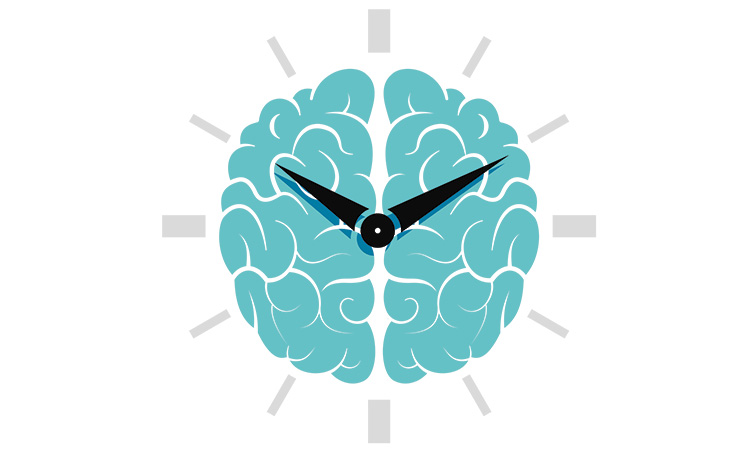A Time Management Article by Harold Taylor
The circadian rhythm is our body’s innate timing device, calibrated against the day and night, which in turn relies upon the rotation of planet Earth on its axis. We are indeed “fearfully and wonderfully made,” and synchronized with the rest of creation. The circadian rhythm’s functions are controlled within the hypothalamus, a portion of our brain. A component of the hypothalamus, called the suprachiasmatic nucleus (SCN) functions like a clock, operating on an almost 24-hour rhythm. I say “almost” because God’s creation is more accurate than the figures selected by the Babylonians or earlier residents of Earth who chose to divide the day plus night into 24 equal parts. It only takes 23 hours, 56 minutes, and 4.09 seconds for the earth to turn once on its axis. But do not fret about that or the other variables that take place in the universe, because our scientists will allow for those things.
What the scientists cannot control however is the impact on our health and productivity that our lifestyles are generating. Among the challenges are such things as jet lag, time zones, shift work, computers, air pollution, and pesticides. When we mess with our environment, we mess with ourselves.
One recent research report, published online July 13, 2020, indicated that “circadian clocks also control many physiological and behavioral processes that impact exposure pathways and disease systems.” In other words, messing with the circadian rhythm can make us sick. We mess with it when we trick the body into thinking it is daylight by lighting up the nights with artificial light, computer screens, and electronic devices, for instance. And by fighting the natural urge to sleep by pumping coffee into our bodies so we can work late or watch late night TV. Scientists now believe that circadian disruption due to changing environment may elevate the risk of disease, such as breast cancer, asthma, and cardiovascular disease.
What can we do about it? We do not want to go backwards and live on farms with no electricity and little technology. Or do we? Some people do, but we would have to get used to breathing fresh air, walking in meadows, riding horses, and eating fresh vegetables, eggs, and bacon and whatever.
Or we could use common sense and realize that we were not created to live and act like machines. So, here are a few suggestions for your consideration.
Prepare for morning the night before. Set aside your laptop or other electronic devices about two hours before bedtime, but never less than one hour. This includes TV. You might consider reading a devotional or two, review scripture, engage in conversation, or do a crossword puzzle. But nothing too heavy, either physical or mental. It may be tempting to watch late night TV, but electronics disrupt the circadian rhythm, and even the light from your iPhone or iPad may delay the brain’s signal to release of melatonin into your body.
You should avoid coffee before going to bed, and ideally you should not have any after 4.00 or 5:00 PM. And start dimming the house lights when it gets dark outside. This helps keep your body in line with its natural rhythm. Try to adopt a consistent bedtime in line with your sleep needs. Adults normally require about 7 hours with 8 hours preferred, and an absolute minimum of six. I must admit I am at the bottom of the scale. I aim for an 11:00 AM bedtime and a 5:30 AM wake-up time. But seldom am I a sleep before 11:30 PM, and I frequently take 20 minutes afternoon naps. But I am an octogenarian, and this influences my sleep needs. I do tend to fall asleep soon after my head hits the pillow.
Since it takes 90 minutes for a complete circadian cycle, I try to get in six complete cycles, giving me 6 hours of sleep. So, if I am in bed before 11:30 PM and up by 5:30 PM, I do okay with my option of the afternoon naps. I recommend you aim for more sleep if possible, at least 7 hours, but you can get by with less. There is a lot going on in our bodies during sleep, which we will discuss in a future blog, so err on the side of getting more sleep than needed, not less.
As soon as possible after you wake up, go for a walk even if it is only for 5 minutes. The natural light will signal your body that it is time to start the day, and you will feel more awake. You can take a longer walk later in the morning or late afternoon or early evening.
I try to avoid coffee in the morning. I have a cup of green tea after my early morning walk, and coffee at the break later in the morning.
More on this next week.
Successful People Read. A Lot.
What do Warren Buffett, Mark Zuckerberg, Elon Musk and Oprah Winfrey have in common? They all read - a LOT! If you want to be successful you need to read. We have over 30 short ebooks designed to get you booked up fast!


